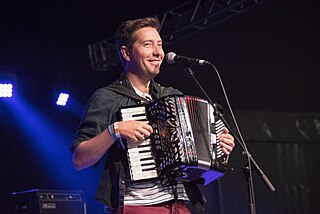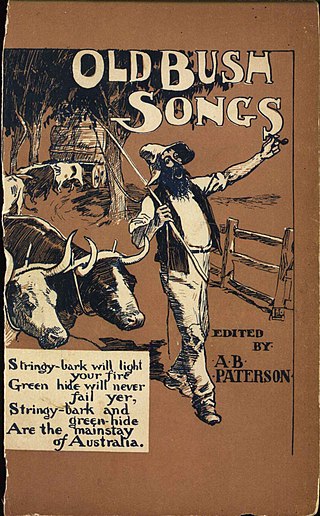
Eric Bogle is a Scottish-born Australian folk singer-songwriter. Born and raised in Scotland, he emigrated to Australia at the age of 25, to settle near Adelaide, South Australia. Bogle's songs have covered a variety of topics and have been performed by many artists. Two of his best known songs are "No Man's Land" and "And the Band Played Waltzing Matilda", with the latter named one of the APRA Top 30 Australian songs in 2001, as part of the celebrations for the Australasian Performing Right Association's 75th anniversary.

Albert Lancaster Lloyd, usually known as A. L. Lloyd or Bert Lloyd, was an English folk singer and collector of folk songs, and as such was a key figure in the British folk revival of the 1950s and 1960s. While Lloyd is most widely known for his work with British folk music, he had a keen interest in the music of Spain, Latin America, Southeastern Europe and Australia. He recorded at least six discs of Australian Bush ballads and folk music.

Fellside Recordings is a British independent record label, formed by Paul Adams and Linda Adams in 1976 in Workington, Cumbria, and still run by them.

Frankie Armstrong is an English singer and voice teacher. She has worked as a singer in the folk scene and the women's movement and as a trainer in social and youth work. Her repertoire ranges from traditional ballads to music-hall and contemporary songs, often focusing on the lives of women.

Trevor George Lucas was an Australian folk singer, a member of Fairport Convention and one of the founders of Fotheringay. He mainly worked as a singer-songwriter and guitarist but also produced many albums and composed for the film industry toward the end of his career. He married three times, his first wife was Cheryl, his second wife was fellow folk musician Sandy Denny (1973–1978), and his third wife was Elizabeth Hurtt (1979–1989). Lucas died on 4 February 1989 of a heart attack in his sleep, in Sydney, aged 45. He was survived by Elizabeth Hurtt, his daughter, Georgia Rose Lucas, and his son, Daniel 'Clancy' Lucas. According to Australian rock music historian Ian McFarlane, Lucas "was one of the most acclaimed singer-songwriters Australia ever produced and although he was held in high regard in UK folk rock circles, he remained virtually unknown in his homeland".
Priscilla Herdman is an American folk singer, whom The New York Times called "one of the clearest and most compelling voices of contemporary folk music." Although she has written songs, she is notable chiefly for her interpretations of other artists' work.
"Young Hunting" is a traditional folk song, Roud 47, catalogued by Francis James Child as Child Ballad number 68, and has its origin in Scotland. Like most traditional songs, numerous variants of the song exist worldwide, notably under the title of "Henry Lee" and "Love Henry" in the United States and "Earl Richard" and sometimes "The Proud Girl" in the United Kingdom.
"Jim Jones at Botany Bay" is a traditional Australian folk ballad dating from the early 19th-century. The narrator, Jim Jones, is found guilty of poaching and sentenced to transportation to the penal colony of New South Wales. En route, his ship is attacked by pirates, but the crew holds them off. When the narrator remarks that he would rather have joined the pirates or indeed drowned at sea than gone to Botany Bay, Jones is reminded by his captors that any mischief will be met with the whip. In the final verse, Jones describes the daily drudgery and degradation of life as a convict in Australia, and dreams of joining the bushrangers and taking revenge on his floggers.
"Bonnie Annie" is a folk ballad recorded from the Scottish and English traditions. Scottish texts are often called Bonnie Annie or The Green Banks of Yarrow, English texts are most often called The Banks of Green Willow. Other titles include The Undutiful Daughter, The High Banks O Yarrow, The Watery Grave, Green Willow, There Was a Rich Merchant that Lived in Strathdinah and The Merchant's Daughter.

Jim Causley is an English folk singer, songwriter, and musician from Devon who specializes in the traditional songs and music of the West Country. Journalist Colin Irwin has called him "the finest singer of his generation".
"Gentle Annie" is a popular American song written by Stephen Foster in 1856. Tradition says that it was written in honor of Annie Jenkins, the daughter of a grocer in Federal Street, Allegheny, Pennsylvania, named Morgan Jenkins. However, Foster's biographer and niece, Evelyn Foster Morneweck, disputes this and states that it is probably written in honor of his cousin, Annie Evans, who died shortly before it was composed. Some sources say it is Foster's farewell to his maternal grandmother, Annie Pratt McGinnis Hart. His paternal grandmother was Ann Barclay.

Sue Harris is an English musician classically trained as an oboeist, but best known for her folk music performances with the hammered dulcimer.
A sporting song is a folk song which celebrates fox hunting, horse racing, gambling and other recreations.

The Bushwackers Band, often simply the Bushwackers, is an Australian folk and country music band or Bush band founded at La Trobe University in Melbourne in 1971.

Nancy Kerr is an English folk musician and songwriter, specialising in the fiddle and singing. She is a Principal Lecturer in Folk Music at Newcastle University. She was the 2015 BBC Radio 2 Folk Awards "Folk Singer of the Year".
Danny Spooner was an Australian traditional folk singer and social historian. Born in England, he left school at the age of 13 and worked as a salvage tug and trawler skipper before moving to Australia in 1962. He rapidly became involved in the Melbourne folk revival centred on Frank Traynor's folk club, and was a major figure in the Australian folk scene thereafter.

Australian folk music is the traditional music from the large variety of immigrant cultures and those of the original Australian inhabitants.

Yuletracks is a studio album released in 1986. A folk music/Christmas music project by Greenwich Village Records, various artists appear on the album, led by Martyn Wyndham-Read and Martin Carthy. Though not all of the albums' artists appear on every track, every artist appears on more than one track. It was recorded in September 1985 to March 1986. It got a re-release on CD in 2011. Brian Snelling engineered the album, with George Peckham cutting the album at Portland Studios. Chris Groom was responsible for the albums' artwork and cover.
Roy Harris was a British folk singer known for his role in the starting the folk club movement in southern Wales in the 1960s. He was often referred to as the “gentleman of folk song” due to his warm personality and congeniality as a folk club host. Harris primarily sang unaccompanied sea and military songs. Over the years Harris recorded over a dozen albums, mostly on the Topic Records and Fellside Recordings labels, along with notable British singers including Ewan MacColl, Frankie Armstrong, Martin Carthy and Martyn Wyndham-Read.
"When Jones' Ale Was New" is an English folk song about men of various trades drinking at an ale-house or tavern. Other titles include "Joan's Ale is New" and "When Johnson's Ale Was New". Originating in the 16th century CE it has been collected frequently from traditional singers in England, and has been found occasionally in Scotland and the USA. It has evolved over the years, and is popular as a chorus song in folk clubs in England.












